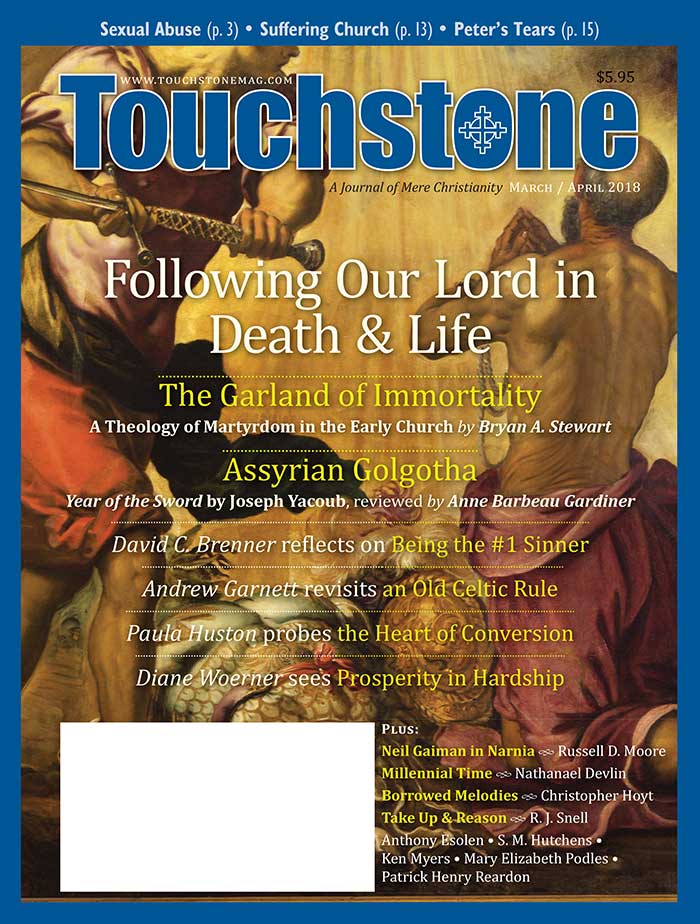Editorial
The Abusive Society
The Far Country of Sexual Rebellion
by James M. Kushiner & James Hitchcock
As the days of 2017 dwindled down to their end, the roster of prominent males accused of sexual harassment and abuse lengthened in inverse proportion.
The phenomenon followed a familiar pattern by which realities that have long been known but have attracted only passing attention are suddenly identified as a national crisis that demands definitive action.
Why this idea’s time has finally come is unclear, although obviously the continually growing influence of feminism is the main explanation. Oddly, however, for a long time feminism itself helped sustain the conditions that made sexual predation possible.
Painting with a broad brush, George Gilder explained the reality fifty years ago in his books Sexual Suicide and Men and Marriage: that by biological inheritance males are aggressive and even violent, whereas women are born with nurturing and protective instincts. This view was a direct challenge to an emergent feminist orthodoxy that insisted, in a way, that women can be just as aggressive as men and are not in need of protection.
It should hardly be a surprise that the newly reawakened awareness of systematic sexual harassment is prevalent especially among politicians and those in the entertainment industry. Politicians are in theory committed to the general welfare, but the nature of their work is the exercise of power. Entertainers can make only slight claims to a higher calling. Their aim is to provide people with pleasure, and they are unlikely to feel a need to deny it to themselves.
Liberation for Abuse
Modern feminism allegedly grew out of the New Left of the 1960s, when women found themselves treated as servants of male leadership, including sexual servants.
There was little complaint at the time, because the women of the New Left shared in the exhilaration of throwing over all forms of social and cultural restraint, in a liberation that rapidly spread through the entire society, including the “straight” people who were despised by the radicals. Limiting sex to marriage and expecting gentlemanly and ladylike behavior became laughably quaint ideas.
The liberal society gradually approved a “playboy” view of sex, promoted by the late Hugh Hefner among others. It became acceptable for married family men to receive the “adult” magazine in their home mailboxes. Those who objected were considered prudes, with sexual hang-ups.
When President Nixon criticized a study, which he commissioned, for failing to show any deleterious effects of pornography, he was ridiculed, and his critics cited “proof” from Scandinavia and the Netherlands that pornography in fact fostered a healthy sexuality.
The only evil connected to sex was its repression, although it could easily have been foreseen that pornography would soon become an uncontrollable epidemic that would descend into the cult of naked violence.
In fact, it was that very repression that helped control sexual predation, partly by the instillation of internal controls, partly by a series of external walls, like rules of propriety on college campuses. The religious imperative of chastity was perhaps the most effective of all, but it was considered antiquated.
The new playboy philosophy approved of the physical abuse of a woman’s reproductive system through the violence of abortion. It was camouflaged as “choice,” implying that abortions are chosen, not coerced. But a great number of women “choosing” to have an abortion do so because a man demands it.
Some such men, knowing they may demand that a woman violate her womb, assume proprietary rights over the bodies of women in general. Only in such a culture does it become possible for a woman, without a second thought, to read a book like Fifty Shades of Grey while sitting next to a young man on an airplane.
Free Fall
In the wake of the sexual revolution, which eliminated most sexual sins by redefining them and rejecting all previous taboos, liberal leaders can only condemn sexual acts they deem non-consensual, a determination that is not always simple. Those currently in positions of power with the loudest voices chastise those they judge to be wicked, absolve others they don’t, and excommunicate the unforgiveable, but the standards are not fixed.
Since the traditional standards of judgment have not been merely revised but entirely abandoned, there is no agreement on what is sinful, what is a proper penance for the guilty, or how one might receive absolution. Having abandoned the standard of self-control upheld by the Judeo-Christian tradition, the revolutionaries are now being consumed by the forces of abuse they have unleashed.
The cultural rebellion of the 1960s was a denial of human sinfulness in the most radical way, and its fruits are everywhere. It has done incalculable damage to religion, to education, and to men, women, and children.
Ultimately, sexual predation can be curbed only by the slow repeal of the sexual revolution. But, to echo Livy’s famous words about his fellow Romans, many people today can endure neither their vices nor the discipline necessary to overcome them.
The repentance and discipline that are difficult, if not impossible, for societies harmed by this kind of rebellion to embrace, are yet incumbent upon Christian churches and all those calling themselves Christians. For those aspects of the sexual revolution that have made inroads in the churches, confession and repentance are the only cure, along with a return to chastity as taught by our forebears, who were not sinless, but acknowledged the power of sex and the virtue of self-control.
James M. Kushiner is the Director of Publications for The Fellowship of St. James and the former Executive Editor of Touchstone.
James Hitchcock is Professor emeritus of History at St. Louis University in St. Louis. He and his late wife Helen have four daughters. His most recent book is the two-volume work, The Supreme Court and Religion in American Life (Princeton University Press, 2004). He is a senior editor of Touchstone.
subscription options
Order
Print/Online Subscription

Get six issues (one year) of Touchstone PLUS full online access including pdf downloads for only $39.95. That's only $3.34 per month!
Order
Online Only
Subscription

Get a one-year full-access subscription to the Touchstone online archives for only $19.95. That's only $1.66 per month!
bulk subscriptions
Order Touchstone subscriptions in bulk and save $10 per sub! Each subscription includes 6 issues of Touchstone plus full online access to touchstonemag.com—including archives, videos, and pdf downloads of recent issues for only $29.95 each! Great for churches or study groups.
Transactions will be processed on a secure server.
more on sex from the online archives

28.3—May/June 2015
Of Bicycles, Sex, & Natural Law
Describing Human Ends & Our Limitations Is Neither Futile Nor Unloving by R. V. Young
more from the online archives

24.6—Nov/Dec 2011
Liberty, Conscience & Autonomy
How the Culture War of the Roaring Twenties Set the Stage for Today’s Catholic & Evangelical Alliance by Barry Hankins
calling all readers
Please Donate
"There are magazines worth reading but few worth saving . . . Touchstone is just such a magazine."
—Alice von Hildebrand
"Here we do not concede one square millimeter of territory to falsehood, folly, contemporary sentimentality, or fashion. We speak the truth, and let God be our judge. . . . Touchstone is the one committedly Christian conservative journal."
—Anthony Esolen, Touchstone senior editor











